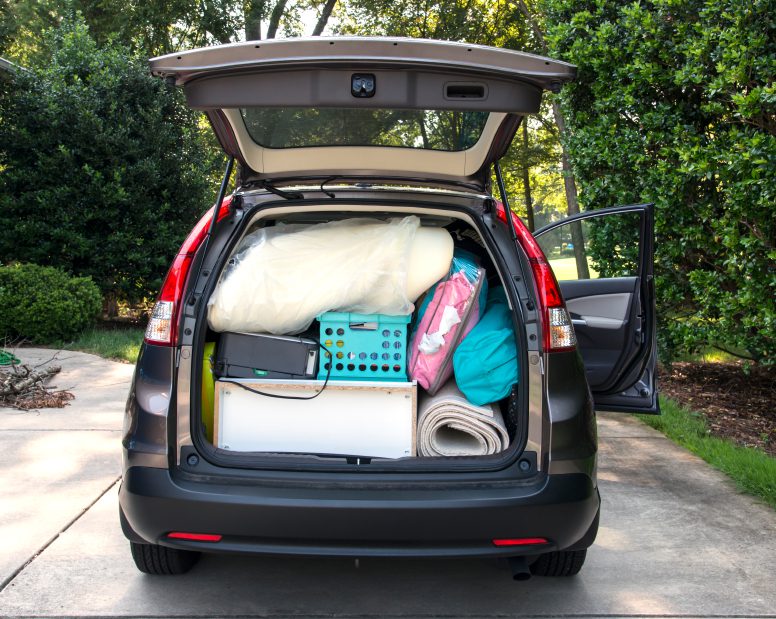When Kids Leave Home: Part 1

Posted in: Hot Topics, Podcast, Teenagers, You & Your Family, Young Adults
Topics: Child + Adolescent Development, Relationships
This is the first blog post in a two-part series on adolescents’ transition to the “real world.”
To view the second blog post, click here.
Intro music written and performed by Dr. Gene Beresin.
Outro music arranged and performed by Dr. Gene Beresin.
If the end of high school senior year is upon you, it means that by now, your kids are mentally preparing to head off to college—or, if they’re not headed to college, they’re off to the professional world.
A major milestone has been reached.
We’re all familiar with those seminal moments in family life: The birth of a child, the first day of school, the first sleepover at a friend’s house, senior prom. While these milestones are inherently exciting, for parents, they’re also inherently nerve-racking.
However, nothing quite compares to when kids leave home to live independently.
Let’s face it. As much as we’ve worked to see our kids through secondary school, as much as we’ve poured our sweat and tears into preparing them for this crucial (and hopefully successful and fulfilling) transition into adult life, most parents experience this launch into adulthood with a combination of enthusiasm and dread.
It is, after all, a loss. It’s why we’re left with the proverbial “empty nest.” So, why don’t we unconditionally relish in our newfound freedom as parents? Well, I think it’s probably because we’re worried—very worried.
What is there to worry about? After all, we’ve made the best possible decisions in terms of colleges and job opportunities for our kids. They’re excited about this great adventure for which they have worked so hard; and, we can understand their excitement. Most of us have been there, and remember it quite well.
Maybe that’s why we worry. We remember our own experiences, our own transitions—and certainly our own mishaps. Adding to this anxiety are horror stories we hear about kids who have had real problems on their own—stories not that far from home—from family, friends, and of course, the media.
So, knowing that a certain level of anxiety is probably inevitable, what are some realistic worries one might have? Here are some of the most common examples, listed with a fair amount of hyperbole, to emphasize their emotional power:
- What if he gets sick—who’s going to take care of him? Will he have the good sense to know where to receive medical attention?
- What if she has a psychiatric problem? After all, more than half of college kids suffer from depression, anxiety, or stress, and there are limited resources available on college campuses—and little to no education about mental health issues.
- What about the party life? Far too many young adults on their own or under peer pressure choose to binge drink or use drugs. And, statistics say that one in five girls is sexually assaulted. Will she be safe?
- Will he actually do his academic work? Or will he inevitably screw up without our daily monitoring and nudging? After all, this is not an inexpensive enterprise for us!
- What about the hazing and reckless things that befall kids who join Greek life or sports teams?
- Will she squander her cash one night and not be able to afford a cab ride home?
- Will I get called by campus security or the local police for any one of a number of offenses—dealing or using drugs, breaking and entering, trespassing, disturbing the peace? Hey, boys will be boys, but will he make sensible decisions and be handled by the authorities with kindness?
- What if she gets into a nasty relationship? What if she is abused, has trouble with roommates, loses her support system? Will she call for help? Does she feel she can trust us if she is in a really bad situation?
We could go on. But, the fact is that emotional, behavioral, and learning challenges are not uncommon in young adulthood. Yet, there is very little guidance on these issues provided on college campuses, and virtually none in the professional world. Mental health resources are terribly sparse. In fact, the Association for University and College Counseling Center Directors Annual Survey notes that for large universities, there may be as little as one paid professional staff person for every 3,000 students.
Thus, there is little focused guidance on managing personal problems. While most kids will have academic advisors and access to student health services, they will rarely use them—they’re often viewed as a burden, an annoyance, or otherwise stigmatized within their peer community.
So, what can parents do to get through this transition? Here are some basic tips:
- Talk. Most kids believe they can manage on their own without involvement from their parents. But, regular contact is important for all parties. Schedule a routine phone call if you can—at times it may be just a simple check -in, but other times it will provide your kids an opportunity to run important things by you. And remember—texting is not talking. There is no substitute for hearing one another’s voices.
- Have Discussions—Not Lectures. Young adults, though still immature in many ways, wish to be treated as adults. They want you to hear their opinions, and, most of all, to value them (interestingly, most kids eventually adopt their parents’ values, though they may push back as teens and young adults). It’s never a good idea to grill them on what they are or are not doing. Instead, ask questions. Ask for their take on things. Treat them the same way you would a friend, partner, or colleague. If this becomes the norm, they are much more likely to open up and ask you for advice.
- Prepare for Rejection. It may be that first slip when he says he’s going “home”—and he’s referring to his dorm or apartment. It may be her choosing to spend Thanksgiving with her boyfriend’s family. There will inevitably be moments we feel the pain of loss, but remember, in no way does it disregard your importance as a parent. It’s really in the service of your child feeling autonomous. Don’t take it personally!
- Give At Least One Get-Out-of-Jail Free Card. Kids will screw up. You did too. It may be bombing an exam, getting fired from a job, breaking a campus rule. While getting in trouble is not OK, it’s best for kids to be able to talk about poor decision-making, learn from their missteps, and hopefully not make the same mistakes again. If you are understanding and tolerant (depending on the offense, of course), you will help your kid appreciate your open ear. And, he will be more likely to come to you if he gets into trouble again.
- Ask About Advisors and Mentors. Whether it’s at work or at school, kids need strong adult mentors other than you (again, prepare to feel a bit rejected). You may recall that even during high school, there were times when it was easier for your kid to talk with a coach, a friend’s parent, or an older sibling. We want them to learn that there are many wise folks in the world besides their parents…after all, you won’t be around forever. Forming supportive relationships with other adults will allow them to seek other perspectives, and think more comprehensively before making decisions—particularly those prone to impulsivity.
- Consult, Don’t Pressure. Remember, whether he is choosing between courses or majors, the decision is ultimately his—not yours. You may have chosen the school (and are certainly paying a small fortune for it), but you need to let your kid and his school advisors help craft the curriculum. Frankly, if you’re able to accept reasonable choices, it’s far more likely he will choose something positive for him, rather than something purely to spite you. After all, we want our kids to be thinking proactively for themselves—and not just reacting to get a rise out of us.
- Help Set Up A Budget. Living independently is a great time to learn about personal finances. After all, your kid cannot rely on the “Bank of Parents” forever. She needs to learn to live within her means, and this involves taking stock of what she has, understanding what she wants, and setting her priorities. It’s very easy for kids to get in over their heads in debt; we know this very well. Let this new beginning be an opportunity for them to learn how to handle their own finances firsthand.
- Broken Hearts Are Inevitable. Relationships are not easy. Sure, one or more breakups may have happened in high school, but she had her friends, her siblings, you, and a familiar and comforting place where she could take solace. Living in a dorm or apartment with relative strangers, on the other hand, can make an already tough parting of ways all the more so. While you want to fix it for her, unfortunately you can’t. But, you can be there to lend a helpful ear.
Leaving home is never easy—for parents, or for kids. But with some clear guidelines, and a little luck, we can all get through this. And then, of course, there’s the next set of milestones to prepare for—marriage, home ownership, grandchildren. But hey, let’s get through this phase first!


 Share
Share Tweet
Tweet







